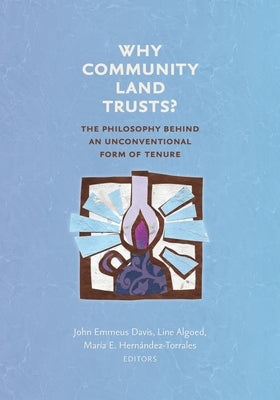Terra Nostra Press
Why Community Land Trusts?: The Philosophy Behind an Unconventional Form of Tenure
Why Community Land Trusts?: The Philosophy Behind an Unconventional Form of Tenure
Couldn't load pickup availability
The community land trust (CLT) is a transformative strategy of community-led development on community-owned land that is taking root across the Global North and is now spreading to the Global South. CLTs produce and preserve affordably priced homes, retail spaces, urban (and rural) aglands, and a variety of neighborhood facilities - all developed under the auspices of people who live nearby; all managed to remain permanently affordable for people of modest means. Because of the way these assets are owned and because of the way these organizations are governed, CLTs offer new answers to fundamental questions of "who decides?" and "who benefits?" that should be asked whenever governments, charities, or NGOs invest scarce resources in improving the places where people live.
CLTs are not all alike. Among the hundreds that exist in a dozen different countries, there are numerous variations in how these organizations are structured, how their lands are utilized, how development is done, and how assets are stewarded for future generations. What is called a "community land trust" can vary greatly from one locality to another.
Despite this lack of uniformity, advocates and practitioners have advanced a consistent set of arguments in favor of this strategy. Their multi-faceted case for the CLT says, in essence: When land is owned for the common good of a place-based community, present and future; when development is done by an organization that is a creature of that community, rooted in it, accountable to it, and guided by it; when stewardship is deliberate, diligent, and durable . . . development is more likely to be both equitable and sustainable, especially in places populated by classes and races who have long been disadvantaged and disempowered.
The six essays contained in this monograph are drawn from a lengthier volume entitled On Common Ground: International Perspectives on the Community Land Trust. Most of that volume's twenty-six chapters were focused on describing conditions, organizations, and polices that precipitated the appearance of CLTs in a range of urban and rural settings. But a number of chapters also looked closely at the philosophy behind this unconventional approach to real property, exploring various ethical, political, and practical justifications for the CLT. These essays were selected for the present monograph. Together, they provide a coherent and compelling rationale for why community land trusts are worthy of consideration, implementation, and support.
Author: John Emmeus Davis
Publisher: Terra Nostra Press
Published: 08/11/2020
Pages: 110
Binding Type: Paperback
Weight: 0.45lbs
Size: 10.00h x 7.01w x 0.23d
ISBN: 9781734403046
About the Author
Davis, John Emmeus: - John Emmeus Davis is a founding partner of Burlington Associates in Community Development, a national consulting cooperative in the USA. He holds an MS and PhD from Cornell University and has taught housing policy and neighborhood planning at New Hampshire College, the University of Vermont, and the Massachusetts Institute of Technology. He served for ten years as the city's housing director in Burlington, Vermont under Mayors Bernie Sanders and Peter Clavelle. Community land trusts (CLTs) have been a prominent part of his professional practice and scholarly writing for 40 years. In addition to publishing a number of books and articles about CLTs, he was a co-producer for the documentary film, Arc of Justice. He is a co-director of the Center for CLT Innovation. (See also: https: //en.wikipedia.org/wiki/John_Emmeus_Davis)Algoed, Line: - Line Algoed is a PhD researcher at Cosmopolis, Center for Urban Research at the Vrije Universiteit in Brussels and a Research Fellow at the International Institute of Social Studies in The Hague. She works with the Caño Martín Peña CLT in Puerto Rico on international exchanges among communities involved in land struggles. She is also an Associate at the Center for CLT Innovation. Previously, Line was a World Habitat Awards Program Manager at BSHF (now World Habitat). She holds an MA in Cultural Anthropology from the University of Leiden and an MA in Sociology from the London School of Economics.Hernández -Torrales, María E.: - María E. Hernández-Torrales holds an LLM in environmental law from the Vermont Law School and an MA in Business Education from New York University. She studied for her undergraduate and Juris Doctor degrees at the University of Puerto Rico. Since 2005 she has been doing pro bono legal work for the Proyecto ENLACE and for the Fideicomiso de la Tierra del Caño Martín Peña. Since 2008, Hernández-Torrales has worked as an attorney and clinical professor at the University of Puerto Rico School of Law where she teaches the Community Economic Development Clinic.
This title is not returnable
Share


